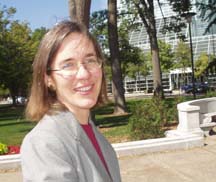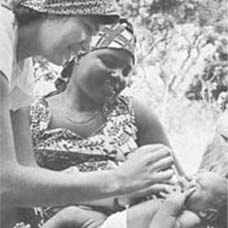
Cameroon RPCV Margaret Krome says How We Grieve Defines Us
How We Grieve Defines Us
by Margaret Krome
In Wednesday's early hours, overcome with sadness over the violence and hatred of Tuesday's attacks, I looked through my window into the night. Oddly, I was comforted by the sight of white steam pluming from two nearby heating plant towers. Back during the Gulf War they'd become a peculiar symbol of hope during many still nights I gazed at them while nursing our infant son. Like many parts of grieving, it was irrational, but I take my comfort where I can.
Our nation will hurt for a long time. We're already trying to process the pain. This morning a colleague wrote a moving e-mail tribute to the humanity of John Ogonowski, the pilot of American Flight 11 that crashed into the World Trade Center. We wait for news about friends and family - one friend's friend was trapped in the Trade Center's North Tower, while my college roommate's father is safe, and my neighbor's daughter was safe in her dormitory near the State Department. Our daughter asks questions about whether our own family is safe now, and our son asks how hijackers could elude airport security systems and who could have done it and why.
It's hard work to understand these and other questions and to grieve the thousands of lives lost in Tuesday's tragedy. Grief counselors talk about five stages of grief that define personal responses to tragedy and loss. These are denial and isolation; anger; bargaining; depression; and acceptance. Who we become as a nation may be determined by how we individually and collectively proceed through those stages.
Denial and isolation. The nation is in shock. Who can absorb the horror or enormity or implications of these crashes? We hate to concede that they paralyzed New York City, the federal government, and most of the nation's commerce and entertainment, at a terrible cost in lives. But they did, and there are people who hate our country enough to kill themselves to show it. To find lasting solutions to terrorism, we must acknowledge that we are vulnerable, hated and viewed as the enemy by millions around the globe.
Anger. It infuriates us that our attackers succeeded so fully, and many want to vent their understandable fury. As political rhetoric roars for retaliation, we must ask careful questions. Are we sure of our targets? Will retaliation reduce the risk of terrorism, or inflame it? Given our gross underestimation of the breadth and depth of hatred against us, are we sure that retaliation will demonstrate strength and result in deterring terrorism? Mightn't it just as likely justify more suicide attacks?
We must also guard against carelessly chosen targets for our frustration and anger at home. Millions of people of Mideastern heritage and millions of Muslims contribute to our nation's prosperity and engage fully in its culture. They must be protected against ethnic targeting by everyone who loves the democracy that was attacked on Tuesday.
Bargaining and depression. The urge to regain control has many faces. Can we protect ourselves against dangers without compromising freedoms we cherish? We must bring technology to our aid to find those solutions. As countless citizens and their families struggle with the direct losses of loved ones and the horror of their deaths, can our need to act be life-giving? So far, the nation has responded in an outpouring of prayers, emotional support, food, help, psychological counseling and blood. This deep commitment to serve each other will be the strength that defines our future. May it be as broad and deep as the hatred that precipitated it.
Acceptance. Tuesday morning catapulted us into accepting our vulnerability in a more dangerous world. We must be clear-eyed in our response. Terror was thrown upon us, but whether we allow ourselves to be terrorized or our souls diminished depends on us. We can live generously, support diverse communities, be cautious in permitting restrictions on our freedoms, and respond strategically rather than biliously to our attackers. This will demonstrate the very humanity that we must then communicate to those who disregard it. A quiet process that avoids careless rhetoric and builds toward broader global understanding can make us a stronger and better country in an unstable world. It may partially redeem this week's incalculable losses.
Margaret Krome is Madison writer.
Copyright 2001 The Capital Times








